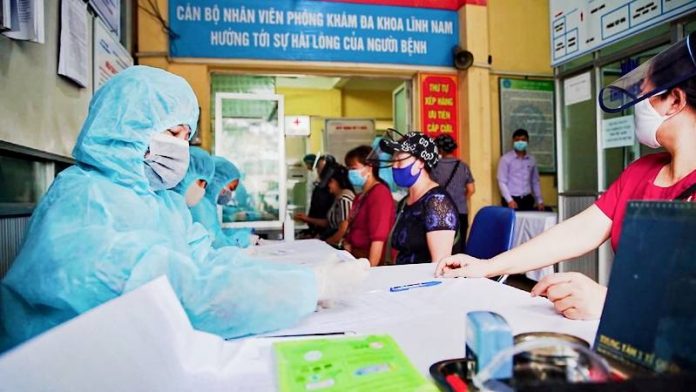Vietnam has reported a dozen new cases after reporting no community transmission for more than 100 days and these new cases were mainly from Da Nang city. As of Aug. 03, 2020 the total cases reached 621 in different areas and reported six Covid-19 deaths. If the country does not have good and strong plans to deal with it, Vietnam would face a second wave of the coronavirus pandemic and its economy would be into a big slump.
The coronavirus pandemic has had a big impact on Vietnam’s economy in the first half of 2020. Gross Domestic Product (GDP) is a measure of the size and health of a country’s economy over a period of time and Vietnam’s GDP shrank 3 percent in the first quarter of 2020 compared to the same period in 2019. Many airlines have halted and cancelled their flights to the infected destinations. The most affected industries are tourism, transport, electronics, agriculture, and insurance. The economy has already been impacted, and then came with the new coronavirus cases.
The impact of the coronavirus pandemic is severe. The growth rate of Vietnam’s economy in the first six months is at 1.81 percent, a biggest drop in 10 years. In the second quarter its GDP grew by just 0.36 percent, leaving Vietnam’s economic growth target of 6.8 percent in 2020 unreachable. As of July 2020, 30.8 million people were affected by the pandemic, in which 2.4 million employees lost their jobs, and the unemployment rate continues to soar, exports fell gradually, travel industry is on the brink of collapse.
Many analysts have predicted that Vietnam’s economy will recover because the country has contained the pandemic and there were some positive signs in various industries to recover. In July 2020 Prime Minister Phuc ordered the Vietnam National Financial and Monetary Policy Advisory to reform the monetary policy to improve Vietnam’s competency; and his government aims to keep Consumer Price Index (CPI) under 4 percent and to accelerate public spending and boost domestic consumption as well as exports. He warned that the Covid-19 pandemic is affecting “many countries that are Vietnam’s important partners and trade investment worldwide and caused a global economic recession.” The reason for this move is to adopt flexible and appropriate fiscal and monetary policies to boost post-pandemic development, attract more investment, support people and businesses affected by the pandemic, ensure macroeconomic stability and promote trust among citizens.
The Vietnamese government would like to keep the inflation rate between 3 percent and 4 percent and its budget deficit to no more than 4 percent of the country’s GDP, while ensuring credit growth over 10 percent this year.
The picture of the Covid-19 pandemic seems to be grim. The impact of the pandemic on Vietnam’s economy and society is clear and much more serious than previous forecasts. In early 2020 the Vietnam Ministry of Investment and Planning predicted that GDP in the second quarter will reduce to 6.09 percent in the event that the coronavirus is effectively controlled, but they are wrong and the economy contracted more than previous forecasts whereas Vietnam fully controlled the pandemic.
The economy of Vietnam is a relatively small and open and it is the 44th largest in the world as measured by nominal GDP and depends on the external factors and on the back of Foreign Direct Investment. Its industries will be weaker if the global supply chains are disrupted by the pandemic. It is worthwhile to mention that Vietnamese economy depends on the conditions of the world market, and the economy will depend on the level of recovery of its economic partners. In 2018, the U.S. economy contributed 15.2 percent to global GDP and its economy has been impacted badly by the Covid-19 pandemic. If the U.S. economy recovers slowly this year, it will disrupt the world economy.
The U.S. is a major trading partner of Vietnam, so it would directly affect the country’s economy. According to an estimation, Vietnam’s export to the U.S. came with a total value of $62.6 billion, if the U.S. cuts imports from Vietnam due to the pandemic its GDP will likely decrease in the long term.
The impact of the Covid-19 pandemic is big for the world economy. It is predicted that the pandemic can trigger the deepest global recession in decades and it would result in a 5.2 percent contraction in global GDP in 2020. The Vietnamese government needs to pump more money to help households and companies; it will be costly but it is essential for Vietnamese citizens who are struggling each day.
Vietnam needs to ensure that the bailout money is spent as fairly and effectively as possible. Hanoi must be ready to ease tariffs and extend credit as well as contingency plans in place to respond in the worst-case scenarios, otherwise the Covid-19 pandemic would destabilise the country and derail the economy.
The views and opinions expressed in this article are those of the author.
Thoi Nguyen is a columnist. A graduate of West London University. He has consulted for the businesses and governments. His works have appeared in the Asian Journal of Comparative Politics, the Dipomat and Entrepreneur among others.


